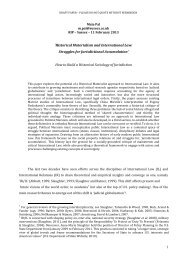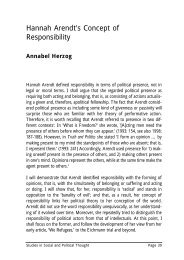Civil Society Theory and Euro-Nationalism - University of Sussex
Civil Society Theory and Euro-Nationalism - University of Sussex
Civil Society Theory and Euro-Nationalism - University of Sussex
Create successful ePaper yourself
Turn your PDF publications into a flip-book with our unique Google optimized e-Paper software.
CIVIL SOCIETY THEORY AND EURO-NATIONALISM<br />
Gellnerian thesis that nations are invented by nationalism. This<br />
combination allows the established states to tar the minorities with<br />
a broad ideological brush <strong>and</strong> deny the legitimacy <strong>of</strong> community<br />
identities as a basis <strong>of</strong> political mobilisation. In this way the<br />
established states avoid confronting the fact that nationalism, as a<br />
general phenomenon, is a form <strong>of</strong> politics inherent within the existing<br />
system <strong>of</strong> states, rather than the invention <strong>of</strong> annoying minority<br />
nationalists.<br />
The next section provides an example <strong>of</strong> the process through which<br />
academic theory is recycled as political rhetoric. In working through<br />
this example the definition <strong>of</strong> ‘civil society theory’ is elaborated<br />
further. In an article in the Spanish daily El País, the economic<br />
historian Gabriel Tortella has argued that, ‘nationalism has become<br />
the star theme <strong>of</strong> the social sciences at the end <strong>of</strong> the 20th century’. 12<br />
While this is certainly correct, it is also important to note that it<br />
has done so in spite <strong>of</strong> the majority <strong>of</strong> social scientists who, until<br />
fairly recently, were predicting the death <strong>of</strong> the nation. The failure<br />
<strong>of</strong> deconstructive efforts to dissolve nationalism <strong>and</strong> national<br />
identity has resulted in their adoption as antagonists <strong>and</strong> in a<br />
tendency to cite them as the principal stumbling blocks to the<br />
progress <strong>of</strong> the civil society project. It might, therefore, be more<br />
accurate to say that nationalism has become the bugbear <strong>of</strong> the<br />
social sciences.<br />
Developing Fine’s argument, it can be said that nations <strong>and</strong><br />
nationalism have joined the ranks <strong>of</strong> the Other for civil society<br />
theory. At the same time, civil society, theorised as their putative<br />
successor, has taken on something <strong>of</strong> the dimensions <strong>of</strong> the<br />
foundational myth 13 held to be characteristic <strong>of</strong> nationalism. The<br />
common ground <strong>of</strong> theorisation around the concept <strong>of</strong> civil society<br />
allows civil society theory a pervasive influence within the social<br />
sciences in general. As a result there has been a tendency towards<br />
a blanket dismissal <strong>of</strong> nationalists as the mere purveyors <strong>of</strong> myths. 14<br />
12 G. Tortella, ‘Nación y raza’, El País, 31.7.1999, p. 11.<br />
13 Fine speaks <strong>of</strong> ‘the sacralisation <strong>of</strong> civil society’ (‘The concept <strong>of</strong> civil society<br />
in civil society theory’, p. 3).<br />
14 It has suggested been to me that this argument is overstated <strong>and</strong> it may be that<br />
35
















